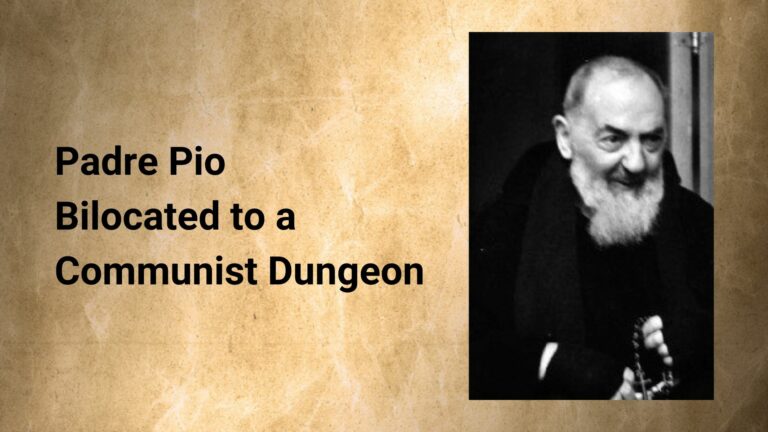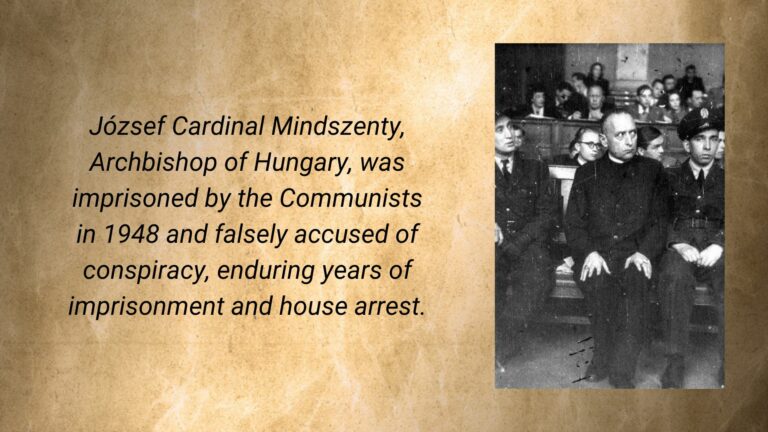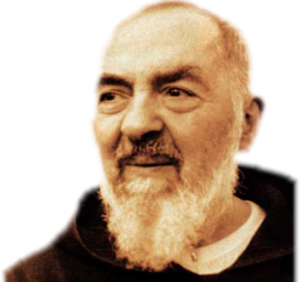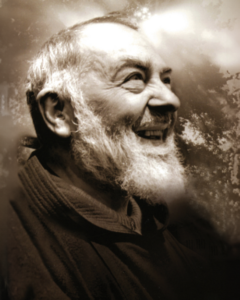
Vaticanist Andrea Tornielli has published on the Vatican Insider site a serious testimony about Padre Pio’s bilocation to the Hungarian dungeon where Joszef Cardinal Mindszenty was imprisoned in the fifties.
The Hungarian anticommunist cardinal was a fierce adversary of the Vatican policy of detente toward Communist governments known as Ostpolitik.
Here is a summary of Tornielli’s article:
A new element has just been added to the collection of miraculous episodes that marked the life of Padre Pio. It is found in a recently published book presented on the 10th anniversary of the dedication of the new sanctuary of San Giovanni Rotondo where the Capuchin’s body is buried.
The testimony tells how Padre Pio bilocated to a jail cell in Budapest where József Cardinal Mindszenty, the Primate of Hungary, was incarcerated.
Bilocation is an extraordinary mystical phenomenon that causes a person to be in two places at the same time. Padre Pio had this rare gift. Eye witnesses in different places attested to his presence, described him, and even talked with him simultaneously.
The already-known Hungarian episode was immortalized in one of the mosaics in the crypt of the sanctuary dedicated to Padre Pio. However, the new testimony contains details never published before.
The book, Padre Pio: his Church and Places Between Devotion, History, and Art, was written by Stefano Campanella, director of Padre Pio Teleradio and author of countless essays about the saint.
It contains a report by Angelo Battisti, director of the House for the Relief of Suffering (the hospital founded by Padre Pio) and typist at the Vatican Secretariat of State. Battisti was one of the witnesses in the saint’s beatification process.
József Cardinal Mindszenty, Archbishop of Esztergom, Primate and Regent of Hungary, was imprisoned by the Communists in December 1948 and condemned to life imprisonment the next year. He was falsely accused of conspiring against the government and spent eight years in jail and under house arrest until he was freed during the popular insurrection of 1956.
He then took refuge at the United States trade delegation office in Budapest until 1973, when Paul VI imposed his resignation and departure from the archdiocese.
The bilocation which took Padre Pio all the way to the cardinal’s cell is said to have taken place during those years.
Here is how Battisti describes the miraculous scene:
“The Capuchin with the stigmata, while [remaining] in San Giovanni Rotondo, went to see the cardinal to bring bread and wine destined to become the body and blood of Christ, that is, the reality of the eighth day [Easter Sunday].
“In this case, the bilocation acquires further significance as an anticipation of the eighth day, i.e. the Resurrection, when the body is freed from the limits of space and time.
“Also symbolic is the inmate registration number printed on his pajamas: 1956, the year of the cardinal’s release.
“As is well known,” Battisti recounts, “Cardinal Mindszenty was arrested, put in jail and watched around the clock. Over time, his desire to celebrate holy Mass strongly increased.
“One morning, Padre Pio presented himself before him with everything he needed. The Cardinal celebrated his Mass and Padre Pio served [as acolyte]; then they spoke, and finally, Padre Pio disappeared with everything he had brought with him.
“A priest from Budapest told me confidentially about the episode, asking if I could get a confirmation from Padre Pio. I answered that if I were to ask something like that, Padre Pio would drive me out of the room hollering.”

Padre Pio
But on a March evening in 1965, at the end of a conversation Battisti asked the stigmatized friar:
“Father, did Cardinal Mindszenty recognize Padre Pio?”
– After a first reaction of irritation, the saint of Gargano answered:
– “Well, we met and talked and so you think he would not have recognized me?”
He thus confirmed his bilocation to the cardinal’s cell, which supposedly happened a few years earlier.
“Then,” Battisti added, “he became sad and said, ‘The devil is ugly, but they had left him uglier than the devil,’” referring to the mistreatment the cardinal suffered.
Padre Pio concluded: “Remember to pray for this great confessor of the faith, who suffered so much for the Church.”



